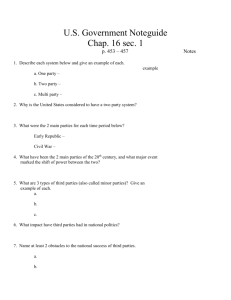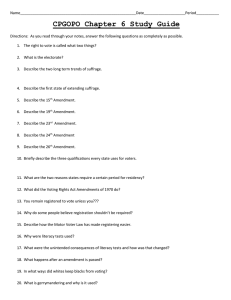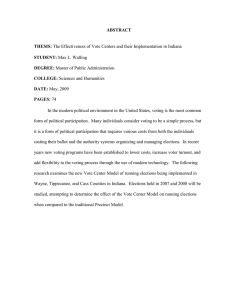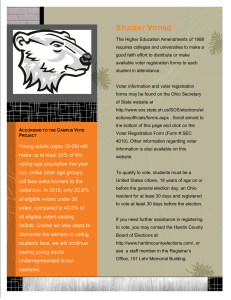Chapter 6 Voters and Voter Behavior Page 148
advertisement
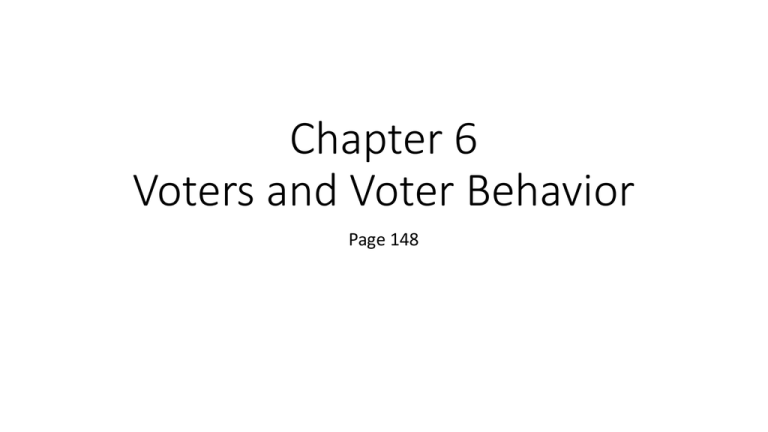
Chapter 6 Voters and Voter Behavior Page 148 Terms: Suffrage-the right to vote. Franchise-the right to vote. Electorate-the potential voting population. Today, the voting franchise in the US is 216,000,000. What are the five steps of extending suffrage in the US? 1. Reduce qualifications to vote, such as religious qualifications, property ownership, and tax payment qualifications. 2. The 15th Amendment was passed to protect any citizen from being denied the vote because of race or color. 3. The 19th Amendment gave women the right to vote. 4. Voting Rights Act of 1965 made racial equality a fact. The 23rd and 24th Amendments added the District of Columbia and did away with poll taxes. What are the five steps of extending suffrage in the US? (continued) 5. The 26th Amendment of 1971 gave 18-year-olds the right to vote. The Federal Government does not have the power to set suffrage qualifications. The Constitution gives that power to the States with but five restrictions. What five restrictions are placed on the States when setting suffrage qualifications? 1. Voters who vote on local elections cannot be stopped from voting nationally. 2. No State can deprive an person of the right to vote because of race or color.— 15th Amendment. What five restrictions are placed on the States when setting suffrage qualifications? (Cont.) 3. No State can deprive a person to vote because of sex. –19th Amendment. 4. No State can require payment of any tax as a condition of voting. –24th Amendment 5. No State can deprive any person who is at least 18-years-old the right to vote. –26th Amendment. Name the three requirements states require people to meet in order to vote. 1. Citizenship 2. Residence 3. Age There is nothing in the Constitution that says aliens cannot vote. Western states allowed non-citizens the right to vote in order to attract settlers to come to their state. This differs greatly from state to state. Terms: Transient-a person living in the State for only a short time. Registration-the procedure of voter identification intended to prevent fraudulent voting. Purge-the process of local officials going through the registered voters list and removing those who are no longer eligible to vote. Poll Books-the official lists of qualified voters in each precinct. Literacy-a person’s ability to read or write. Poll Tax—a special tax required for voting. What is the problem with setting voting restrictions? If voting restrictions are too easy, it encourages voting fraud. If voting restrictions are too difficult, it discourages legitimate voting. What did the 1993 Motor Voter Law require from each state? 1. Allow all eligible citizens to register to vote when they apply for or renew a drivers’ license. 2. Provide for voter registration by mail. 3. Make registration forms available at local offices of employment, welfare, and other social service agencies. After five years, 8 million people were registered as a direct result from the Motor Voter Law. Under what circumstances do states deny the right to vote? • People are in mental institutions or are found to be mentally incompetent • Any person convicted of serious crimes • Anyone dishonorably discharged from the armed forces Suffrage and Civil Rights The beginning of extending the vote to African Americans had its beginnings with the 15th Amendment in 1870. The problem, however, was the 15th Amendment did not provide for a means to enforce implementation of the 15th Amendment. That was up to Congress, and Congress did not act for almost 90 years. Some of the methods used to keep African Americans from voting were • Poll taxes • White primaries – In the South, the Democrats used the law to exclude people. Most states defined a political party as a “private association.” Therefore, Democrats could exclude certain people from participating. • Gerrymandering-the practice of drawing electoral district lines in order to limit the voting strength of a particular group or party. The Supreme Court had several cases in which they ruled in support of the 15th Amendment. The Civil Rights Movement led by Dr. Martin Luther King, Jr. combined with the Supreme Court rulings finally forced Congress to act. What laws were passed by Congress to implement the 15th Amendment? • • • • Civil Rights Act of 1957 The Civil Rights Act of 1960 The Civil Rights Act of 1964 The Voting Rights Act of 1965 The Civil Rights Act of 1957 • Established the US Civil Rights Commission-one of the main jobs of the Commission was to investigate claims of voter discrimination. • Gave the Attorney-General the power to prevent interference with any person’s right to vote in any federal election. The Civil Rights Act of 1960 • Provided for the appointment of federal voting referees, and were given the power to help qualified persons to register and vote in federal elections. The Civil Rights Act of 1964 • This law had more teeth than the first two. • It outlawed discrimination in the work place and in the voting booth. • This law specifically outlawed the use of any voter registration or literacy requirement in an Injunction-a court order that forces or unfair and discriminatory limits the performance of some act by manner. a private individual or public official. The Voting Rights Act of 1965 • This law finally upheld all aspects of the 15th Amendment. • This law applied to all voting in the US—national, state, and local. • No election laws could go into effect unless first given preclearance-approval-by the Department of Justice. This law was timid. It only had a fiveyear duration. It has since been amended and extended. Voter Behavior Nonvoters “The word idiot came to our language from the Greek. In ancient Athens, idiots (idiotes) were those citizens who did not vote or otherwise take part in public life.” Voter apathy is greater in off-year elections. Off-Year Elections – congressional elections held in the even-numbered years between presidential elections. Here’s a very weird fact… There are millions of nonvoters among those who vote. In 2004’s election, 10,000,000 people who voted for president did not vote for congressional candidates. Nonvoting voters also do not tend to vote for local and state candidates. Who are nonvoters? Those who are convinced that their votes make little real difference. People who have no sense of political efficacy. Political efficacy - the amount of faith and impact citizens feel or believe they have upon their government. Factors Affecting Voter Turnout • • • • • Cumbersome election procedures Long ballots Long lines at polling places Bad weather Lack of interest

